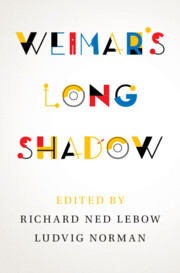Book contents
- Weimar’s Long Shadow
- Weimar’s Long Shadow
- Copyright page
- Contents
- Contributors
- Note on Bauhaus Font and the Cover Design
- 1 Why Weimar?
- 2 An Unheroic but Understandable Failure
- 3 Bonn’s Weimar
- 4 The Paradigmatic Example of Weimar and Postwar Political Science
- 5 Swedish Social Democracy and Weimar
- 6 Our Past, Weimar’s Present
- 7 Weimar on the Potomac?
- 8 Shadows of Babylon and Shreds of Artificial Silk
- 9 Militant Democracy
- 10 Weimar and Modernity
- Index
1 - Why Weimar?
Published online by Cambridge University Press: 26 September 2024
- Weimar’s Long Shadow
- Weimar’s Long Shadow
- Copyright page
- Contents
- Contributors
- Note on Bauhaus Font and the Cover Design
- 1 Why Weimar?
- 2 An Unheroic but Understandable Failure
- 3 Bonn’s Weimar
- 4 The Paradigmatic Example of Weimar and Postwar Political Science
- 5 Swedish Social Democracy and Weimar
- 6 Our Past, Weimar’s Present
- 7 Weimar on the Potomac?
- 8 Shadows of Babylon and Shreds of Artificial Silk
- 9 Militant Democracy
- 10 Weimar and Modernity
- Index
Summary
In this introductory chapter, Lebow and Norman identify the Weimar Republic and its collapse as the paradigmatic historical example shaping political thinking about fragility and robustness in the postwar world. It spells out the volume’s analytical focus on Weimar lessons in comparative perspective and identifies its theoretical starting points in a broader scholarly field concerned with the role of historical analogies in politics.
- Type
- Chapter
- Information
- Weimar's Long Shadow , pp. 1 - 24Publisher: Cambridge University PressPrint publication year: 2024

